#Manufacturing ERP Software Company
Explore tagged Tumblr posts
Text
How to Choose the Best ERP for Engineering and Manufacturing Industry
In today’s fast-paced world, engineering and manufacturing companies face increasing pressure to deliver high-quality products while maintaining efficiency and cost-effectiveness. Implementing the right Enterprise Resource Planning (ERP) software can significantly enhance operations, streamline workflows, and boost productivity. However, with numerous options available, selecting the best ERP software for the engineering and manufacturing industry can be challenging. This guide will help you navigate this decision-making process and choose the most suitable solution for your business.
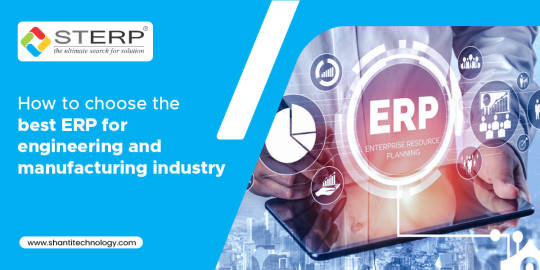
Why ERP is Crucial for Engineering and Manufacturing
ERP software integrates various business processes, including production, inventory management, supply chain, finance, and human resources. For engineering and manufacturing companies, ERP solutions are particularly vital because they:
Facilitate real-time data sharing across departments.
Enhance supply chain management.
Optimize production planning and scheduling.
Ensure compliance with industry standards.
Reduce operational costs.
Partnering with the right Engineering ERP software company ensures that your organization leverages these benefits to stay competitive in a dynamic market.
Steps to Choose the Best ERP for Engineering and Manufacturing
1. Understand Your Business Needs
Before exploring ERP solutions, evaluate your company’s specific requirements. Identify the pain points in your current processes and prioritize the features you need in an ERP system. Common features for engineering and manufacturing companies include:
Bill of Materials (BOM) management
Production planning and scheduling
Inventory control
Quality management
Financial reporting
Consulting with a reputed ERP software company can help you match your needs with the right features.
2. Look for Industry-Specific Solutions
Generic ERP software might not address the unique needs of the engineering and manufacturing sector. Opt for an ERP software in India that offers modules tailored to your industry. Such solutions are designed to handle specific challenges like multi-level BOM, project costing, and shop floor management.
3. Check Vendor Expertise
Choosing a reliable vendor is as important as selecting the software itself. Research ERP solution providers with a strong track record in serving engineering and manufacturing companies. Look for reviews, case studies, and client testimonials to gauge their expertise.
4. Evaluate Scalability and Flexibility
Your business will grow, and so will your operational requirements. Ensure that the ERP system you choose is scalable and flexible enough to accommodate future needs. The top 10 ERP software providers in India offer scalable solutions that can adapt to changing business demands.
5. Assess Integration Capabilities
An ERP system must integrate seamlessly with your existing tools, such as Computer-Aided Design (CAD) software, Customer Relationship Management (CRM) systems, and IoT devices. A well-integrated system reduces redundancies and enhances efficiency.
6. Prioritize User-Friendliness
A complex system with a steep learning curve can hinder adoption. Choose an ERP software with an intuitive interface and easy navigation. This ensures that your employees can use the system effectively without extensive training.
7. Consider Customization Options
No two businesses are alike. While standard ERP solutions offer core functionalities, some companies require customization to align with specific workflows. A trusted ERP software company in India can provide custom modules tailored to your unique needs.
8. Focus on Data Security
Engineering and manufacturing companies often deal with sensitive data. Ensure that the ERP solution complies with the latest security standards and offers robust data protection features.
9. Compare Pricing and ROI
While cost is an important factor, it should not be the sole criterion. Evaluate the long-term return on investment (ROI) offered by different ERP software. A slightly expensive but feature-rich solution from the best ERP software provider in India may deliver better value than a cheaper alternative with limited functionalities.
10. Test Before You Commit
Most ERP software companies offer free trials or demo versions. Use these opportunities to test the software in a real-world scenario. Gather feedback from your team and ensure the solution meets your expectations before finalizing your decision.
Benefits of Partnering with the Best ERP Software Providers in India
India is home to some of the leading ERP software providers in India, offering state-of-the-art solutions for the engineering and manufacturing sector. Partnering with a reputable provider ensures:
Access to advanced features tailored to your industry.
Reliable customer support.
Comprehensive training and implementation services.
Regular updates and enhancements to the software.
Companies like Shantitechnology (STERP) specialize in delivering cutting-edge ERP solutions that cater specifically to engineering and manufacturing businesses. With years of expertise, they rank among the top 10 ERP software providers in India, ensuring seamless integration and exceptional performance.
Conclusion
Selecting the right ERP software is a critical decision that can impact your company’s efficiency, productivity, and profitability. By understanding your requirements, researching vendors, and prioritizing features like scalability, integration, and security, you can find the perfect ERP solution for your engineering or manufacturing business.
If you are looking for a trusted ERP software company in India, consider partnering with a provider like STERP. As one of the best ERP software providers in India, STERP offers comprehensive solutions tailored to the unique needs of engineering and manufacturing companies. With their expertise, you can streamline your operations, improve decision-making, and stay ahead in a competitive market.
Get in touch with STERP – the leading Engineering ERP software company – to transform your business with a reliable and efficient ERP system. Take the first step toward a smarter, more connected future today!
#Manufacturing ERP software company#ERP solution provider#Engineering ERP software company#ERP software company#ERP software companies
4 notes
·
View notes
Text
Essential Factors for the Manufacturing ERP Software
Table of Contents:
How to Choose the Best ERP for Manufacturing?
How PMTRACK ERP Software Company in Pune Helps
Conclusion
In the rapidly evolving landscape of manufacturing, efficiency, precision, and adaptability is paramount. Choosing the right Enterprise Resource Planning (ERP) software can be a game-changer for manufacturing companies, streamlining operations and fostering growth. However, the decision-making process requires careful consideration of several factors to ensure the selected ERP system aligns seamlessly with the unique needs of your manufacturing operations.
How to Choose the Best ERP for Manufacturing?
Choosing the best ERP software for manufacturing can be difficult. However, you can select it easily by considering a few essential tips for choosing ERP Software:
1. Industry-Specific Functionality:
Manufacturing ERP software should be tailored to the specific needs of your industry. Consider solutions that offer features such as demand forecasting, production scheduling, and quality management, ensuring that the software is designed to address the nuances of your manufacturing processes.
2.Scalability:
Choose an ERP system that grows with your business. A scalable ERP solution ensures long-term viability and return on investment.
3.Integration Capabilities:
Look for ERP software that easily integrates with your current technology stack, including manufacturing equipment, CRM systems, and financial software.
4.User-Friendly Interface:
A user-friendly interface is key to ensuring successful adoption by your team. Look for ERP software that provides an intuitive dashboard, easy navigation, and comprehensive training and support resources to minimize the learning curve for your staff.
5.Data Security and Compliance:
Manufacturing involves handling sensitive data, and compliance with industry regulations is non-negotiable. Choose ERP software with robust security features, data encryption, and compliance with relevant industry standards to safeguard your critical information.
6. Mobile Accessibility:
In today’s fast-paced manufacturing environment, the ability to access real-time data from anywhere is invaluable. Opt for ERP software with mobile accessibility, allowing key personnel to monitor operations, make decisions, and stay connected on the go.
7. Customization Options:
Every manufacturing operation is unique. Look for ERP software that offers customization options to tailor the system to your specific workflows and business processes. This ensures that the ERP solution aligns seamlessly with your operational requirements.
8.Supplier Reputation and Support:
Selecting a reputable ERP provider is crucial. Research the track record of potential suppliers, read customer reviews, and assess the level of ongoing support they offer. A reliable provider with excellent customer support ensures a smooth implementation and ongoing success.
9. Total Cost of Ownership:
Consider the total cost of ownership, including initial implementation costs, licensing fees, ongoing maintenance, and potential scalability expenses. A clear understanding of these costs helps in making an informed decision aligned with your budget and long-term financial goals.
10.Future Technology Trends:
Stay forward-focused by choosing ERP software that embraces emerging technologies such as Artificial Intelligence and advanced analytics. A future-ready ERP solution positions your manufacturing operations for continued innovation and competitiveness.
How PMTRACK ERP Helps
Explore the power of PMTRACK ERP, the best ERP software in Pune, and revolutionize your project management approach. From initial project planning to real-time collaboration and analytics, our ERP solution is the catalyst for efficient, transparent, and successful project delivery. Our intuitive and powerful Enterprise Resource Planning (ERP) solution is designed to transform the way you manage projects. Here’s a brief glimpse into how PMTRACK ERP Software Company in Pune works:
1.Seamless Integration:
PMTRACK ERP seamlessly integrates with your existing systems, creating a centralized hub for project-related data. Whether it’s project planning, resource allocation, or financial management, our ERP ensures a cohesive flow of information.
2.Comprehensive Project Planning:
Initiate projects with confidence. PMTRACK ERP facilitates detailed project planning, allowing you to outline tasks, set milestones, and allocate resources efficiently.
3.Resource Allocation and Management:
Efficient resource management is at the core of PMTRACK ERP. Easily allocate resources based on skills, availability, and project requirements. Our ERP ensures that your team is optimally utilized, enhancing productivity and minimizing bottlenecks.
4.Real-Time Collaboration:
PMTRACK ERP offers real-time updates, document sharing, and communication tools, fostering a collaborative environment that enhances efficiency and accelerates project timelines.
5.Financial Visibility:
Gain clear insights into project finances with PMTRACK ERP. Track budgets, expenses, and revenue in real time. The system provides a transparent view of financial performance, enabling informed decision-making and ensuring projects stay on budget.
6.Analytics and Reporting:
PMTRACK ERP generates customizable reports, offering deep insights into project progress, resource utilization, and financial metrics.
7.Scalability for Growth:
As your organization evolves, so should your project management capabilities. PMTRACK ERP is scalable, accommodating the changing needs of your projects and ensuring that the solution grows alongside your business.
8.User-Friendly Interface:
PMTRACK ERP prioritizes user experience. With an intuitive interface, users can navigate the system effortlessly, reducing training time and ensuring widespread adoption across your organization.
9.Tailored to Your Needs:
Every organization is unique, and PMTRACK ERP is designed with that in mind. Tailor the system to match your specific project management processes and requirements, ensuring a solution that fits seamlessly into your workflow.
By carefully evaluating these essential factors, you ensure that the chosen ERP system not only meets your current needs but also provides a foundation for sustained growth and success in the ever-evolving manufacturing landscape. Choose wisely, invest thoughtfully, and propel your manufacturing operations into a future of efficiency and agility. PMTRACK ERP is one of the best ERP solution providers in Pune and is your perfect choice when choosing manufacturing ERP software.
Conclusion
When choosing an ERP partner, be sure that your ERP requirements fit the demands of the firm. Consider the budget, total cost of ownership, and return on investment. Consider automation and customization, which save time and money while decreasing human error.
PMTRACK ERP has helped some of the world’s biggest manufacturers in the selection and installation of ERP software. PMTRACK ERP uses best practices and vast industry and enterprise technology experience to maximize the success and value of your projects, whether it’s ERP selection, implementation, connections, or ongoing maintenance.
If you’re ready to take the first step towards transforming your business with an ERP, please call +91-8600004221 or request a demo today to learn more about PMTRACK ERP. Please let us know how we can make your ERP project a bit easier.
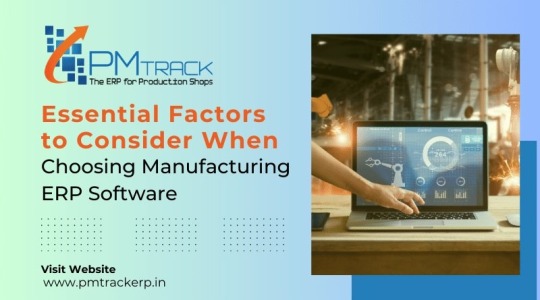
#Manufacturing ERP Software#Essential Factors for the ERP Selection#Manufacturing ERP Software Company#best ERP software for manufacturing#ERP Software Company in Pune#best ERP solution providers in Pune
0 notes
Text
ERP Trends 2024: What Engineering and Manufacturing Industries Need to Know
As we navigate through 2024, the landscape of Enterprise Resource Planning (ERP) systems continues to evolve, presenting both opportunities and challenges for engineering and manufacturing industries. Companies in this sector, especially those in key industrial regions like Maharashtra, Mumbai, Pune, and Gujarat, must stay abreast of the latest ERP trends to maintain competitive advantage and operational efficiency. In this blog, we’ll delve into the significant ERP trends of 2024 and their implications for the engineering and manufacturing sectors.
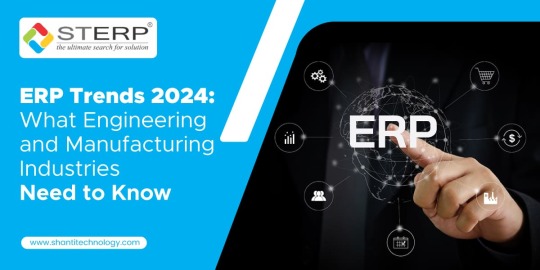
1. Increased Adoption of Cloud-Based ERP Solutions
One of the most significant trends in ERP software for engineering companies in Maharashtra and across India is the shift towards cloud-based solutions. Cloud ERP offers several advantages over traditional on-premise systems, including lower upfront costs, greater scalability, and enhanced accessibility.
Benefits of Cloud-Based ERP:
Cost Efficiency: Eliminates the need for expensive hardware and reduces IT maintenance costs.
Scalability: Easily adjusts to the growing needs of a manufacturing company in Gujarat or an engineering firm in Mumbai.
Accessibility: Provides access to real-time data from anywhere, facilitating better decision-making.
Leading ERP software companies in Pune are increasingly offering cloud-based solutions tailored to the needs of local engineering and manufacturing businesses. These solutions support remote work and ensure business continuity in an increasingly digital world.
2. Integration of AI and Machine Learning
Artificial Intelligence (AI) and Machine Learning (ML) are revolutionizing ERP systems by providing intelligent insights and automating routine tasks. For ERP software for engineering companies in Mumbai, integrating AI can enhance predictive maintenance, optimize supply chain management, and improve production planning.
AI and ML Applications in ERP:
Predictive Analytics: Helps foresee equipment failures and reduce downtime.
Supply Chain Optimization: Enhances demand forecasting and inventory management.
Process Automation: Automates repetitive tasks, freeing up human resources for more strategic roles.
ERP solution providers in Pune are at the forefront of integrating AI and ML into their systems, enabling companies to leverage advanced analytics and improve overall operational efficiency.
3. Emphasis on Cybersecurity
With the increasing digitization of manufacturing processes, cybersecurity has become a critical concern. ERP systems, being the backbone of business operations, are prime targets for cyber-attacks. Engineering and manufacturing companies in regions like Gujarat and Maharashtra need robust cybersecurity measures to protect their sensitive data.
Key Cybersecurity Features:
Data Encryption: Protects data during transmission and storage.
Multi-Factor Authentication: Enhances user authentication processes.
Regular Security Audits: Ensures continuous monitoring and improvement of security protocols.
ERP software for engineering companies in Maharashtra must incorporate these advanced security features to safeguard against data breaches and cyber threats.
4. Enhanced User Experience (UX)
User experience has become a critical factor in ERP adoption and utilization. Modern ERP systems are focusing on intuitive interfaces and user-friendly designs to ensure that all employees, regardless of their technical expertise, can effectively use the system.
UX Improvements:
Intuitive Dashboards: Provide real-time insights and easy navigation.
Mobile Accessibility: Ensures that users can access ERP data on-the-go.
Customization Options: Allow users to tailor the system to their specific needs.
ERP software companies in Pune are prioritizing user experience in their solutions, making it easier for engineering and manufacturing firms to train their staff and increase productivity.
5. Internet of Things (IoT) Integration
The integration of IoT with ERP systems is another trend transforming the manufacturing industry. IoT devices collect vast amounts of data from production lines, equipment, and other operational areas, which can be analyzed by the ERP system to optimize performance.
IoT Benefits in ERP:
Real-Time Monitoring: Provides immediate insights into production processes.
Predictive Maintenance: Schedules maintenance activities based on equipment condition rather than time intervals.
Enhanced Quality Control: Monitors product quality throughout the manufacturing process.
For ERP for manufacturing companies in Gujarat, IoT integration offers a significant advantage by improving efficiency and reducing operational costs.
6. Sustainability and Green Manufacturing
Sustainability is becoming a critical focus for manufacturing companies worldwide. ERP systems are evolving to support green manufacturing practices by tracking and optimizing resource usage, reducing waste, and ensuring compliance with environmental regulations.
Sustainable ERP Features:
Resource Management: Tracks energy and material usage to minimize waste.
Regulatory Compliance: Ensures adherence to environmental laws and standards.
Sustainability Reporting: Provides detailed reports on sustainability metrics.
Engineering and manufacturing companies in regions like Mumbai and Maharashtra can benefit from ERP solutions that incorporate sustainability features, helping them achieve their environmental goals and enhance their corporate reputation.
7. Modular and Flexible ERP Solutions
In response to the diverse needs of engineering and manufacturing firms, ERP solution providers in Pune are developing more modular and flexible ERP systems. These systems allow companies to select and implement only the modules they need, which can be easily scaled and customized as their business grows.
Advantages of Modular ERP:
Cost-Effective: Pay only for the features you need.
Scalability: Easily add new modules as your business requirements evolve.
Customization: Tailor the system to fit specific operational needs.
This trend is particularly beneficial for small to medium-sized enterprises (SMEs) in the engineering and manufacturing sectors, enabling them to adopt ERP systems without the burden of high costs or complexity.
8. Focus on Customer-Centric Manufacturing
ERP systems are increasingly supporting customer-centric manufacturing practices, where production processes are aligned with customer needs and preferences. This approach enhances customer satisfaction and drives business growth.
Customer-Centric ERP Features:
Custom Order Management: Handles unique customer requirements and specifications.
Enhanced CRM Integration: Integrates with customer relationship management (CRM) systems for a holistic view of customer interactions.
Real-Time Order Tracking: Provides customers with real-time updates on their orders.
Manufacturing companies in Gujarat and engineering firms in Maharashtra are leveraging these customer-centric ERP features to improve their service levels and build stronger customer relationships.
9. Advanced Analytics and Business Intelligence (BI)
Advanced analytics and BI are becoming integral components of modern ERP systems. These tools provide deep insights into business operations, helping companies make data-driven decisions and improve performance.
Key BI Features:
Data Visualization: Converts complex data into easy-to-understand charts and graphs.
Dashboards: Offer a real-time overview of key performance indicators (KPIs).
Predictive Analytics: Forecasts future trends based on historical data.
ERP software companies in Pune are incorporating advanced analytics and BI capabilities into their systems, empowering engineering and manufacturing firms to gain a competitive edge through better insights and informed decision-making.
10. Globalization and Localization Support
As engineering and manufacturing companies expand their operations globally, ERP systems must support multiple languages, currencies, and regulatory requirements. Globalization and localization features are essential for companies operating in diverse markets.
Globalization Features:
Multi-Language Support: Accommodates users from different regions.
Multi-Currency Handling: Manages transactions in various currencies.
Compliance with Local Regulations: Ensures adherence to regional laws and standards.
ERP solution providers in Pune and other industrial hubs are enhancing their systems to support global operations, enabling companies to seamlessly manage their international business processes.
Conclusion
The ERP landscape for engineering and manufacturing industries is rapidly evolving, driven by advancements in technology and changing business needs. Companies in Maharashtra, Mumbai, Pune, and Gujarat must stay informed about these trends to leverage the full potential of ERP systems. By adopting cloud-based solutions, integrating AI and IoT, prioritizing cybersecurity, and focusing on sustainability, businesses can achieve greater efficiency, competitiveness, and growth in 2024 and beyond.
For engineering and manufacturing firms looking for the best ERP software for engineering companies in Maharashtra or ERP for manufacturing companies in Gujarat, it is crucial to partner with leading ERP solution providers in Pune who understand the unique challenges and opportunities in this sector. Embracing these trends will not only enhance operational efficiency but also drive innovation and sustainability in the engineering and manufacturing industries.
By staying ahead of these ERP trends, companies can position themselves for success in an increasingly digital and interconnected world. Whether you are an engineering firm in Mumbai or a manufacturing company in Gujarat, the right ERP system can transform your operations and pave the way for a prosperous future.
#ERP software in Vadodara#Manufacturing ERP software in Gujarat#ERP software companies in Vadodara#ERP software providers in Vadodara#ERP for manufacturing company in Gujarat#ERP software#ERP system#cloud ERP#ERP solutions#software development#engineering ERP#management software#engineering services#engineering industry
5 notes
·
View notes
Text
#erp software#cloud erp#erp application#erp consulting services#erp development company#erp development services#erp for small business#erp system#erp integration#crm software#erp for manufacturing
1 note
·
View note
Text
#erp#erp software#erp system#erp implementation#erp solutions#cloud erp#erp integration#erpsolutions#erp for manufacturing#erp development company
0 notes
Text

Choosing the right ERP is crucial for business growth. Odoo and SAP are top contenders, but which one suits your needs best? Our in-depth comparison explores key features, pricing, scalability, and industry suitability to help you make an informed decision. Whether you're a small business or an enterprise, discover the pros and cons of each system and find the perfect fit for your operations. Don’t invest blindly—read our expert guide now and choose the best ERP for your business success! To Read More click here
#erp#erp software#erp solution bd#erpsoftware#erp system#odoo development#odoo development company#odoo#odoo development services#odoo erp#dubai#dublin#software development#web development#development#technologies#developer#software#services#united states#america#united states of america#england#united kingdom#london#scotland#wales#businesssuccess#business#manufacturing
0 notes
Text
In the ever-evolving world of construction, managing complex projects, diverse teams, and intricate workflows is no easy feat. From tracking material costs to ensuring on-time project delivery, the construction industry faces unique challenges that demand efficient solutions. This is where ERP software for construction company becomes a game-changer. It’s not just a tool but a strategic asset that can revolutionize how your business operates.
Read more:
#profitacc365#erp software for construction company#erp software for small business#best erp software in uae#erp for real estate developers#manufacturing erp software
0 notes
Text
Empowering Businesses: ERP Software Development Services in Mumbai

In today’s fast-paced and competitive business landscape, organizations in Mumbai are increasingly turning to Enterprise Resource Planning (ERP) systems to streamline operations and enhance productivity. ERP software integrates core business processes into a unified system, enabling real-time data access and seamless collaboration across departments. By partnering with the best ERP software development company in Mumbai businesses can leverage cutting-edge technology to optimize their workflows and drive growth.
The Role of ERP in Business Success
ERP systems play a crucial role in improving efficiency and decision-making. They centralize data from various departments, providing a comprehensive overview of business operations. This enables businesses to identify bottlenecks, reduce redundancies, and implement strategic improvements. Whether it’s inventory management, production planning, or customer relationship management, ERP systems ensure all processes are aligned and efficient. For companies in Mumbai, adopting ERP solutions tailored to their specific needs is key to staying competitive in a dynamic market.
Best ERP Software Development Company in Mumbai
Mumbai is one of the most innovative ERP developers, offering customized solutions that cater to diverse industries. The best ERP software development company in Mumbai provides comprehensive services, from system design to implementation and support. These companies focus on creating scalable and user-friendly ERP solutions that adapt to evolving business needs. With expertise in various industries, they ensure that businesses receive tailored systems that address their unique challenges and opportunities.
ERP Software Implementation Services in Mumbai
Implementing an ERP system is a critical step in transforming business operations. ERP software implementation services in Mumbai involve a thorough analysis of business processes to ensure the new system integrates seamlessly with existing workflows. These services include system customization, data migration, user training, and post-implementation support. Proper implementation minimizes downtime, enhances user adoption, and ensures the ERP system delivers maximum value. Companies offering these services in Mumbai focus on delivering smooth and efficient transitions, enabling businesses to reap the full benefits of their ERP investment.
ERP Software for the Manufacturing Industry in Mumbai
The manufacturing industry in Mumbai faces unique challenges, such as managing complex supply chains, optimizing production schedules, and maintaining quality control. ERP software for the manufacturing industry in Mumbai addresses these challenges by providing tools for real-time tracking, resource allocation, and performance monitoring. Manufacturing ERP systems streamline processes from raw material procurement to final product delivery, ensuring efficiency and reducing costs. Additionally, they offer advanced reporting and analytics, enabling manufacturers to make informed decisions and respond quickly to market demands. By adopting industry-specific ERP solutions, manufacturing companies can achieve higher operational efficiency and maintain a competitive edge.
Conclusion
ERP software development and implementation have become essential for businesses in Mumbai aiming to improve efficiency, reduce costs, and drive growth. Partnering with the best ERP software development company in Mumbai ensures access to tailored solutions that meet industry-specific needs. From seamless ERP software implementation services in Mumbai to advanced tools for the manufacturing sector, ERP systems empower businesses to thrive in a competitive market. Embrace the power of ERP to streamline operations and unlock your business’s full potential.
#ERP software for the manufacturing industry in Mumbai#best ERP software development company in Mumbai
0 notes
Text
Streamline Supply Chain Management with NetSuite Consulting Services
For manufacturers and distributors efficiently managing a supply chain is essential in today's world when efficiency and speed are paramount. Businesses want tools that can keep up, whether that means delivering goods more quickly keeping ideal inventory levels, or remaining flexible in the face of shifting consumer demands. This is where NetSuite is useful.
OpenTeQ a reputable NetSuite service provider assists companies in utilizing this powerful ERP system to streamline supply chain processes and boost productivity. Let's examine how NetSuite changes supply chains and why it's essential for contemporary companies.
1. Simplifying Operations with NetSuite ERP for Manufacturers
For manufacturers, managing a supply chain can feel like juggling a dozen balls at once—procurement, production schedules, inventory management, and distribution all need to align perfectly. This is where NetSuite ERP for Manufacturers becomes a game-changer.
NetSuite offers a centralized platform where all these processes are interconnected. With real-time data at your fingertips, you can minimize delays, optimize inventory levels, and streamline operations. OpenTeQ works with manufacturers to customize NetSuite to fit their unique needs, ensuring everything runs like a well-oiled machine.
2. Tailored Solutions with NetSuite Industry Activation
No two industries are alike, and supply chain challenges can vary significantly. That’s why NetSuite Industry Activation is such a powerful tool—it provides industry-specific features to address unique needs.
For instance, manufacturers can use it to automate demand planning, while retailers can optimize their distribution networks. OpenTeQ ensures businesses unlock the full potential of these tailored solutions, helping them gain an edge in competitive markets.
3. Connecting the Dots with NetSuite Integration Platform
In today’s interconnected world, supply chains depend on various systems working together seamlessly—think CRM tools, shipping platforms, and procurement software. The NetSuite Integration Platform ensures all these systems talk to each other without hiccups.
OpenTeQ specializes in creating these connections, eliminating manual data entry errors, and ensuring a smooth flow of information across departments. When everything is integrated, your team can focus on making strategic decisions instead of dealing with technical roadblocks.
4. Expert Support Through NetSuite Consulting Services
Navigating the ins and outs of NetSuite can be overwhelming without the right guidance. That’s where OpenTeQ’s NetSuite Consulting Services step in.
Their experts take the time to understand your specific challenges and goals. Whether it’s tweaking workflows, automating repetitive tasks, or training your team, they ensure you’re getting the most out of NetSuite. With their support, businesses can improve supply chain visibility, scalability, and control.
5. Making Decisions Easier with Real-Time Visibility
One of the biggest perks of NetSuite is its ability to give you a clear, real-time view of your entire supply chain. You can track inventory levels, forecast demand, and spot potential bottlenecks before they become a problem.
OpenTeQ helps businesses set up personalized dashboards and reports that provide actionable insights, so you’re always a step ahead. This transparency makes it easier to adapt quickly to changes while keeping operations smooth and customers happy.
Why OpenTeQ is the Right Partner for Your NetSuite Journey
OpenTeQ is more than just a service provider—they’re a partner in helping you succeed. With expertise in NetSuite Industry Activation NetSuite ERP for Manufacturers, NetSuite Consulting Services, and the NetSuite Integration Platform, they make sure you’re using NetSuite to its fullest potential.
Their tailored solutions and hands-on approach help businesses simplify supply chain complexities, boost efficiency, and drive growth.
Conclusion:
Managing supply chains is no small feat, but NetSuite makes it easier. With tools designed to streamline operations, offer tailored solutions, connect systems seamlessly, and provide real-time insights, it’s an essential platform for any business looking to stay competitive.
When paired with OpenTeQ’s expertise, NetSuite becomes a powerful ally in achieving supply chain excellence. Ready to take your supply chain to the next level? Let OpenTeQ show you how.
Reach out to OpenTeQ for expert NetSuite services tailored to your business needs. Contact Us: [email protected], +1-469 623 5106.
#NetSuite Industry Activation#NetSuite ERP for Manufacturers#NetSuite Consulting Services#NetSuite Integration Platform#Industry Activation NetSuite#NetSuite for Manufacturing#NetSuite Manufacturing ERP & Management Software#NetSuite ERP Software for Manufacturing Companies#NetSuite for Manufacturers#Manufacturing with NetSuite#NetSuite Solutions for Manufacturing#NetSuite Portals for Manufacturing#NetSuite Services#NetSuite Services Company#Top NetSuite Services Provider#NetSuite Support Services#NetSuite Integration Consultants#NetSuite Integration Solutions
0 notes
Text
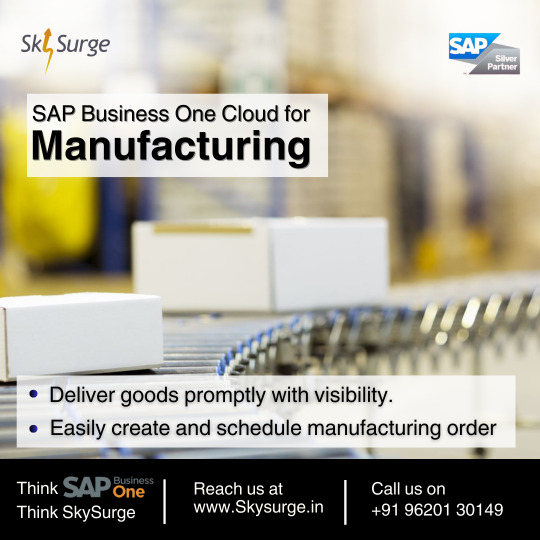
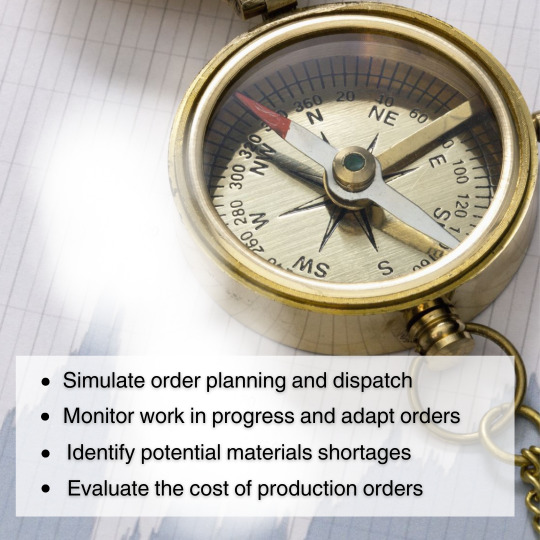
Make manufacturing simple with SAP Business One Cloud! 🌟 Plan and track your work, check for missing materials, and keep everything running smoothly. It's like having a smart helper to make sure you finish on time and save money too
#sap b1#cloud erp#sap erp#clouderp#sap business one#erpsolutions#erp software#erp for small business#sapbusinessone#cloud partner#manufacturing erp#manufacturing industries#manufacturing erp software#manufacturing with netsuite#services#industry#industries#manufacturing supply company#warehouse#development#manufacturing consent
0 notes
Text
ERP Software for Small Manufacturing Company - Growthawk
Growthawk specializes in delivering tailored ERP software for small manufacturing company, enabling streamlined operations, enhanced productivity, and scalable solutions to meet industry-specific challenges. Discover how ERP software for small manufacturing companies can transform your business. Learn how to optimize production, improve inventory management, and enhance decision-making with powerful ERP solutions. Partner with Growthawk to unlock the full potential of your manufacturing operations.
For More details visit our website: https://erp.growthawk.com/small-manufacturing
0 notes
Text
Top 10 ERP software provider in India | shantitechnology
STERP (shantitechnology) is a leading ERP solution provider in Pune, delivering industry-focused ERP for manufacturing companies in Pune. As one of the top 10 ERP software providers in India, we specialize in streamlining operations with cutting-edge manufacturing ERP software in Pune. Trusted among the best ERP software providers in Pune, we empower businesses with seamless automation and efficiency.
Choose STERP – one of the most reliable ERP software companies in Pune for unmatched enterprise solutions!
#ERP for manufacturing company in Pune#Manufacturing ERP software in Pune#ERP solution providers in Pune#India#ERP software providers in Pune#Pune#Mumbai#Maharashtra#ERP software companies in Pune#Top 10 ERP software provider in India#ERP solution#ERP software#Cloud ERP#Business Solution#MSME#SME#business analyst#business analysis#ERP software provider
5 notes
·
View notes
Text
Gujarat is a vibrant city of culture that is now growing as a hub of industries and commercial activities. Many businesses in different sectors, like manufacturing, textiles, pharmaceuticals, etc., have been thriving in this state in the past few years. To thrive and remain efficient in this region in today’s era, every business needs to start adopting Enterprise Resource Planning (ERP) software. With the utilization of the services provided by ERP software companies in Gujarat, companies can streamline operations, enhance production, and improve growth rates.
#Manufacturing ERP Software Companies in Gujarat#ERP Software Companies in Gujarat#manufacturing ERP software company in Vadodara#Gujarat#ERP software firms in Gujarat#ERP solution in Gujarat
0 notes
Text
Zillancer: Best Manufacturing ERP for Small Businesses
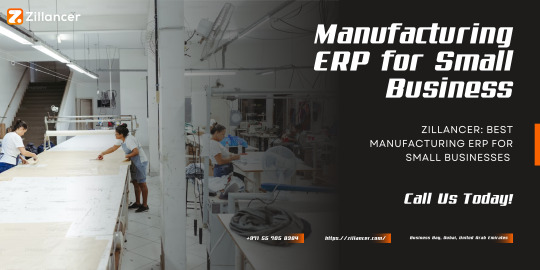
Small businesses in the manufacturing sector can now achieve better efficiency with ERP software solutions. Zillancer connects you with expert freelancers to help integrate customized ERP systems that simplify your processes, boost productivity, and foster growth. Get your manufacturing operations running smoothly with our tailored ERP solutions.
#Best ERP for Manufacturing#Best ERP for Small Manufacturing Business#Best ERP for Manufacturing Industry#Top 10 Manufacturing ERP Systems#Best Cloud ERP for Manufacturing#Manufacturing ERP#Manufacturing ERP for Small Business#Best ERP Systems for Manufacturing#ERP for Manufacturing Industry#ERP System for Small Manufacturing#Top 10 ERP Software for Manufacturing#ERP for Custom Manufacturing#Top ERP for Manufacturing#Cloud Based ERP for Manufacturing#ERP for Manufacturing Companies#ERP Manufacturing Module#ONEERP#Microsoft Dynamics 365#Microsoft Dynamics Business Central
0 notes